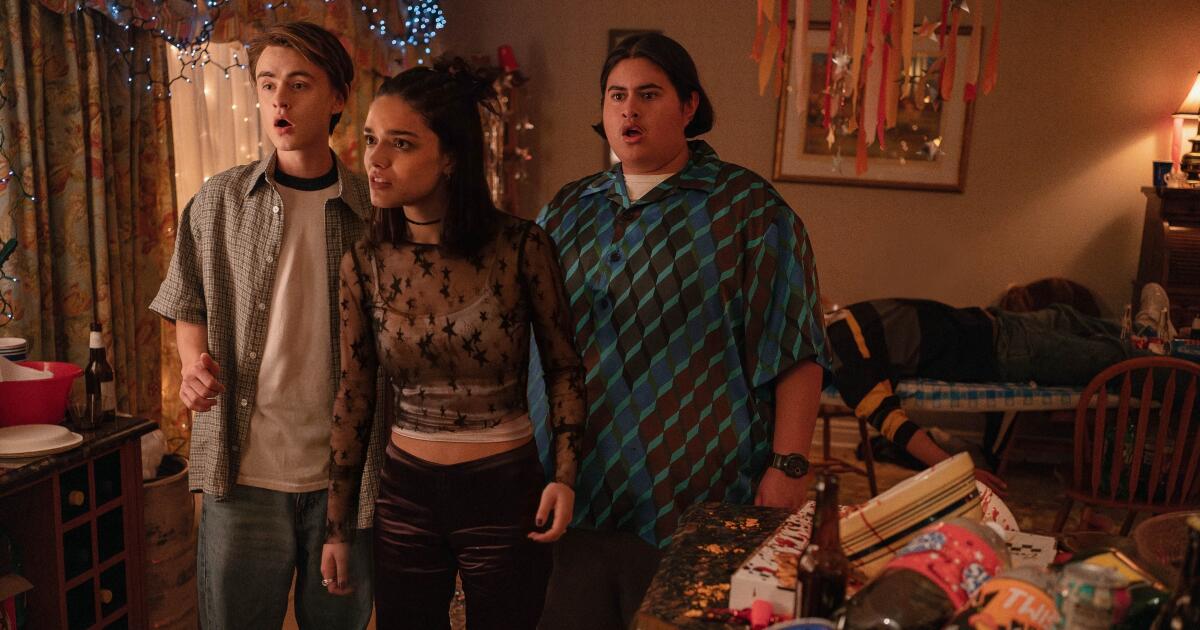“Saturday Night Live” alum Kyle Mooney’s directorial debut, “Y2K,” makes for a fascinating test case of Gen Z’s appetite for all things 2000s. His comedic sensibility, honed through throwback TV parodies on “SNL,” is at once broad and hyper-specific. In the nostalgic “Y2K,” he hits the big signposts that will delight the younger generation craving the simpler times of a pre-9/11 world, but he also gets granular with late ’90s music, fashion and culture in a way that one could only understand if they actually lived through it. Zoomers just won’t pick up everything he’s putting down, and that may work against this otherwise exuberant and somewhat messy teen horror-comedy.
Mooney and co-writer Evan Winter fuse the “let’s throw a big party” plot formula to “The Terminator” for their “Y2K” script, but it also feels like they just wrote down everything they could remember from the late ’90s and threw it at the wall: Enron, the “Macarena,” PalmPilots, Limp Bizkit, the swing revival. Some are quite obvious and on-the-nose, others more arcane. Add in some well-worn movie tropes, a list of outrageous horror movie kills and a “TRL”-friendly soundtrack and that’s essentially the movie.
Jaedan Martell, one of horror’s preeminent sad boys (“It,” “The Lodge,” etc.), plays Eli, a dorky kid who loves his ebullient best friend, Danny (Julian Dennison), and has a crush on Laura (Rachel Zegler), whom he hopes to kiss at the big turn-of-the-millennium New Year’s Eve party after he finds out she’s broken up with her college boyfriend (Mason Gooding). But in a bit of revisionist history, the Y2K bug is real — so real, in fact, that every electronic device and appliance bands together into freakish robotic monsters in order to kill the teens, enslave the parents and achieve the “singularity.”
Despite the deep wealth of period culture on display, “Y2K” doesn’t necessarily feel lived-in — it’s a bit too wink-wink, nudge-nudge with it and feels forced, especially with the wall-to-wall needle drops. There are fun nods to era-specific tribes and trends, with quick references to the swing kids, ravers and rap-rock skater types, but where Mooney and Winter’s approach excels is in the deep cuts for the real ’90s-heads out there, like Daniel Zolghadri’s character as CJ, a socially conscious hip-hop kid wearing baggy khakis and a bucket hat, talking about his rap group, Prophets of Intelligence, and scolding his peers for their “corporate” music taste. Mooney is also a standout as Garrett, a burnout video-store clerk with dreads, who represents jam-band stinky hippie culture, and he nails every note-perfect inflection.
But references like this will likely sail right over the heads of a zoomer audience — you simply had to be there in order to get it. Most of the audience at the film’s Los Angeles premiere didn’t react to even broader pop-cultural nods, such as several Limp Bizkit jokes (singer Fred Durst plays himself in a slightly larger-than-cameo role).
The surface pleasures of “Y2K” are outlandishly fun, but plot-wise, the film is structurally unsound. While it cribs bits and pieces from too familiar genres, it’s too loose in how scenes flow into each other or how the story progresses from A to B. Although Durst is a welcome sight, it’s still entirely random how he shows up, and the final resolution is sketchy at best.
What’s interesting about Mooney’s vision is that he’s packaged contemporary technological anxiety into a memory piece. Fear about artificial intelligence taking over humanity is a modern concern, but it wasn’t what we were worried about with the Y2K bug.
Still, there’s also something kind of profound in contemplating 2000, even if it is refracted through this movie’s silly lens. In the 24 years since, it’s been decades of terrorism, war, political instability, a widening wealth gap and rapid advancements that have rewired our culture, our brains and how we relate to each other.
Perhaps 2000 was, indeed, a fundamental switch, one that Mooney has zeroed in on through his imperfect but amusing “Y2K.” Ultimately, the project is a success, because he made this millennial — who was 16 in 1999 — profoundly nostalgic for what seems like a more innocent time.
Katie Walsh is a Tribune News Service film critic.

